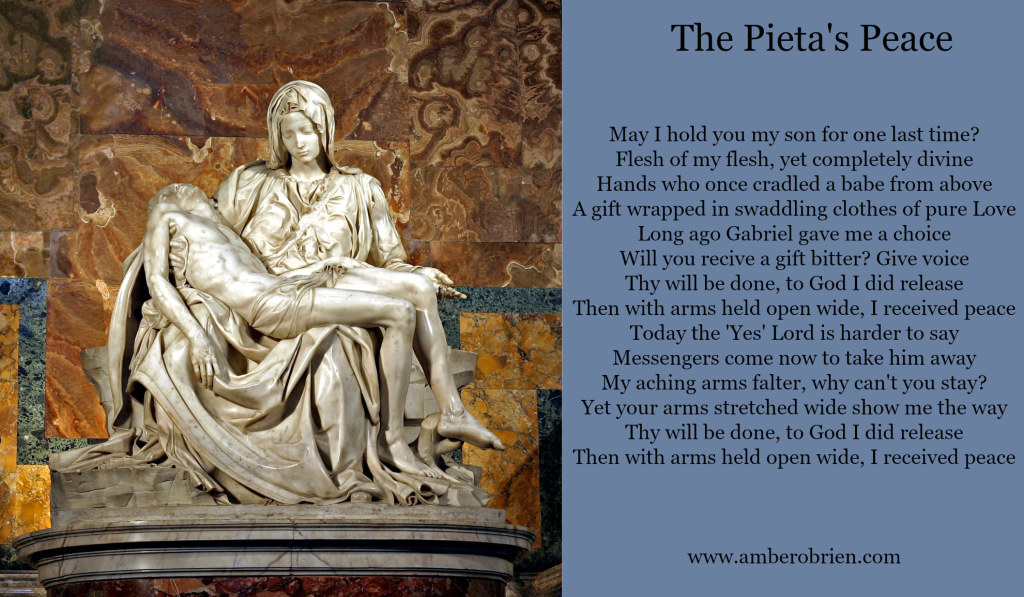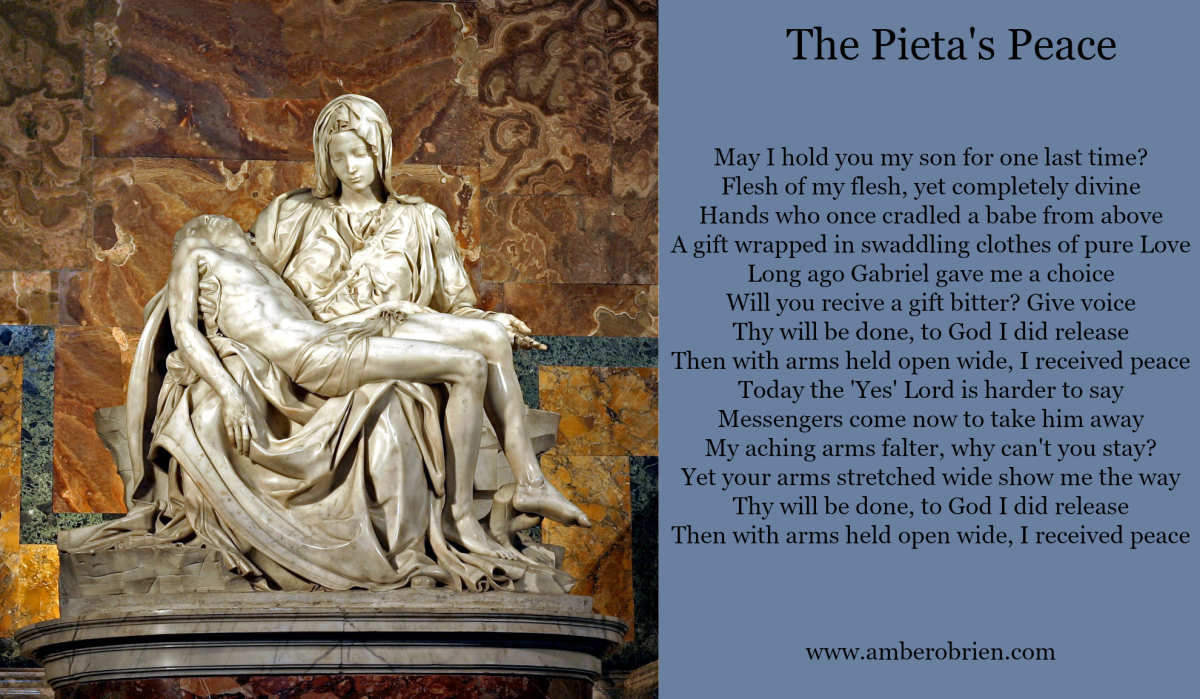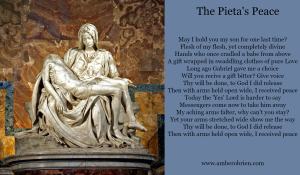
| Ch. 7 of Amber O’Brien’s Book Love. Always. Wins. |
Clunk. She dropped the phone and started to sob uncontrollably.
Hearing only the dial tone, I collapsed in a nearby chair stunned by my own words. I could only wonder how my dear friend would respond as she sat in her wheelchair in a psychiatric day room while she recovered from a stroke. Would she follow through on her threats to end her life ? Did I just push her over the edge?
Two-and-a-half years before this call, I had moved right next door to her and we had often chatted while our children played. Soon I discovered her grief due to the recent loss of her father, along with other stressful life changes. But as the months passed, Cindy seemed to be stuck in her sorrow. Because of the continuous blue days, she enlisted a psychiatrist and received medications, yet nothing seemed to alleviate her pain. In addition, sleepless nights and panic attacks escalated into a severe clinical depression.
My heart hurt for her as I watched her struggle. I doubled some meals to share with her family, and her three children often spent time in my home as I helped them with schoolwork. I held her hand while she cried, and often prayed for her. However, my words never seemed to sink in.
During this time, I observed Cindy’s unending freefall into the depths of unsuccessful treatments that seemed to make her situation worse, not better. I felt so helpless. Admission to the hospital seven separate times proved fruitless for her, even while different combinations of medications had been prescribed. Horror shook me the day I noticed the black and blue marks that ran all the way up and down her arms because of the needles used to put her under for electrical shock treatments. As a last resort, my friend submitted to ECT which erased her memory and left her in a zombie-like state and with no expression on her face.
Equally painful was the awareness I had of the profound effects that Cindy’s illness caused for her children. Her voice flat, her words few, and her lack of awareness about her family shadowed the entire household.
Medical setback, after setback, seemed to fling Cindy deeper into depression. Where was God? I wondered. Why won’t you help this family?
Then the depression penetrated so deeply that Cindy attempted suicide. One day, after her family had left the house for school and work, she swallowed a bottle of pills. Her husband found her in time and drove her to the emergency room. She screamed, “NO! I want to die! Leave me alone!” again and again as they pumped her stomach.
In contrast, right next door in our own home, my two little girls and I felt excitement as we prepared for our third baby. But to our great shock, Megan was born three months early, and soon rested in the clear plastic incubator in the NICU. I sat in a wheelchair beside her, dazed, and sore with the staples in my stomach from the emergency cesarean.
Two days later on Christmas morning , I found myself still alone and confused in my stark, white hospital bed. They released me so that I could go home to be with my family, but Megan would need to stay in the NICU and would not be coming with me. Why did you allow this to happen, Lord? I pleaded fervently, Please , please, don’t let my baby die!
~~~
On January 30th in a psychiatric hospital not far away, my dear friend, Cindy, experienced a hypertensive crisis. After being transferred to a local shock trauma center, she underwent surgery due to a stroke and remained in ICU. Now Cindy lay paralyzed, unable to speak or move. So now, in addition to battling depression, she became a patient incapable of attending to her own personal needs of bathing, dressing, feeding herself, and walking.
It was only three days later on February 2nd, that I sat, again, in another hospital holding my precious baby girl for the very last time. After forty long days of ups and downs, the doctor informed us that her little organs had begun to permanently shut down. I held my tiny daughter in my arms as she breathed her last while my husband cried softly in the corner of the room.
During this final moment that I held our infant daughter, I sensed a supernatural peace. I knew for certain that Megan, an innocent baby, was now “healed in heaven,” and safe in the arms of Jesus.
I absolutely felt God’s peace and presence that day, but as the weeks after her death crawled by, my initial numbness melted away. I felt overcome with disappointment and anger.
Cindy became more and more angry at God too.
In fact, Cindy’s anger prevented her from following instructions, and she decided to stop taking her medication and food altogether. That is when Cindy’s husband called to inform me that, “Tomorrow they will have to put a tube down her throat to force feed her.”
Suddenly, my compassion for Cindy turned to anger. When I heard that she was making a conscious decision to end her life, then I had had enough. My own loss over Megan’s death fueled my passion as I picked up the phone to call Cindy.
Her ears recognized my voice, but not my stern, authoritative tone. “I heard you have stopped eating?” I started.
“That’s right,” she answered. After a pause, she continued. “Maybe when I’m dead and gone, then everyone will realize how sick I really was, and they’ll be sorry. Mark will be sorry he didn’t take my illness more seriously.”
“Cindy —NO ONE is going to feel sorry for you if you die. They are going to feel sorry for Mark who would be left alone with three small children. Life will go on if you die. Sure, Mark will grieve for a little while, but then he will marry another woman! Someone else who will then take care of your children! They need you, Cindy! They are not being properly cared for.” “That’s Mark’s job now,” she retorted.
“NO, it isn’t! You are the mother. You have been very strong-willed and selfcentered. All you have thought about is yourself and your needs. You never flick an eye to help others, not even your own family. You’re so wrapped up in anger and resentment that you can’t see beyond the tip of your nose!”
That is when she dropped the phone out of her hand that had been propped on the wheelchair. Clunk! Unbeknownst to me, she began to sob so loudly that staff ran to her and took her back to her room.
A few hours later, providentially, a pastor visited to talk and to pray with her.
He reminded her about how God valued her life, and about how her family loved her and needed her. Later that afternoon, Cindy pondered my piercing words that paved the way for her to hear the warmth of God’s love for her spoken by the minister.
Over the next few weeks, Cindy worked with a physical therapist every day as she recovered from the damage done by the stroke. From relearning to feed herself and to walk again, she made steady progress.
After time to reflect, Cindy made an important phone call to her husband. “Mark —I want to tell you! I gave my life to Christ last night! I could hardly sleep all night! —I was so full of joy!”
Cindy progressed physically, but I was most excited about her new desire to pray and to memorize scripture. I wrote out Bible verses for her which she taped to the wall next to her hospital bed and she memorized each one. Not long after, she asked God to help her to forgive her father and all the other ones who had hurt her. Cindy began to pray, keep a journal, and listen to a Christian radio station.
Four months after the stroke, she finally returned home. Even though she had more speech, occupational, and physical therapy ahead of her, and she couldn’t even drive a car for a few more months, her depression had lifted. Day by day, I watched as God healed her physically, mentally, and spiritually.
One morning, I visited her home while she was still recovering and sitting in a rolling chair. She shone with gratefulness as she explained to me that she wanted to buy pizza for all those still left behind in the psychiatric ward. In addition to her awareness of others, I noticed that her eyes often looked upward when she shared about even the smallest reason for thanksgiving that others might take for granted. “I was taking a bath and noticed my toes!
How amazing of God to give us toes so that we can balance.”
Twenty-five years later, even though other life hardships and challenges have taken place, Cindy has not fallen back into depression. Now she peer coaches others who are hurting in her church and in the surrounding community, and she shares her amazing testimony of God’s faithfulness.
Both of my prayer requests for healing were answered for my dear friend and for my beautiful baby.
One healed on earth, the other healed in heaven.
* * *
Surrender
(short poem)
He stretched out his wounded hands,
and embraced the world,
“Father, forgive them,
for they know not what they do.”
Then He surrendered His Spirit,
And His will to His father.
Oh, this is Love.
After Rising from the dead,
He once more stretched out his nail-scarred hands,
And said, “Peace be with you,”
A trinity of times.
He then breathed out His Spirit
“Forgive, as I forgive.”
Oh, this is Love.
* * *
Mary’s Love Song
Poem
Its already been a long road,
They judge and stare at me,
Every door was closed in Bethlehem,
But your Love rescues me.
They already try to kill Him,
King Herod makes us flee,
A sword will pierce this mother’s heart,
But your Love sets me free.
Heaven, Manna from Heaven,
Purest of Love and Light,
Rests in my arms tonight,
Heaven, I’m holding Heaven,
And. All. Will. Be. Made. Right.
All will be made right… through Jesus,
All will be made right,
Heaven’s best sent down to save us, so,
All. Will. Be. Made. Right.
Both the Holy Lamb of Heaven,
and All-Mighty God is He,
He comes to break the chains of sin,
To set All people free.
In this world we will have trouble,
So He came to hold our hands,
Our story ends in victory,
Heaven for those who stand.
Heaven, Manna from Heaven,
Purest of Love and Light,
Rests in my arms tonight,
Heaven, I’m holding Heaven,
And. All. Will. Be. Made. Right.
All will be made right… through Jesus,
All will be made right,
Heaven’s best sent down to save us, so,
All . Will. Be. Made. Right.
* * *
The Pieta’s Peace
~~Sometimes winning means letting go~~
I couldn’t stop gazing at her hands. Carved from white marble, they did not tightly grip him, but they gently cradled his limp body upon her lap. Her left hand lay open with its palm facing upward as her beautiful, serene face admired her lifeless son.
St. Peter’s Basilica in Vatican City overwhelmed me as I knew I could never take in all the meaning and beauty within a single visit. One of the largest churches in the world, as well as a masterpiece of architecture, it contains numerous chapels and altars with lavish decorations, renaissance paintings, mosaics, and sculptures.
Despite the numerous fascinating art adhering to every ceiling, wall, and floor in the massive cathedral that houses the tomb of St. Peter, I felt drawn back to Mary’s hands. The smooth, small relinquished open palms portrayed in the masterpiece, The Pieta, by the world-renowned sculptor, Michelangelo, spoke to my own grieving heart.
The Pieta depicts a moment just after Jesus is taken down from the cross, and when his mother, Mary, holds him in her lap one last time. The sculpture, chiseled out of stone 1500 years prior, mesmerizes crowds today who stand in silence to comprehend the heart-wrenching experience of Mary. The son who the angel had promised would be called the Son of God, lay dead in her arms after the long torture of scourging by whips, rejection and mocking by men, and dying the horrendous, slow death of suffocaton on the cross. Despite this treatment, Jesus demonstrated love until His last dying words which extended forgiveness for those who hurt him.
I kept wandering back to this stunning statue to ponder the secret of Mary’s beautiful, peaceful face. The answer, I realized, lay in those open, trusting hands. Mary’s hands still rested palm up while Jesus lay on her lap. Meanwhile, my own heart and hands tightly gripped a loved one back home who faced a difficult situation.
Captivated by The Pieta and the message it carried, I decided to google Michelangelo and his timeless sculpture. At the early age of six, after losing his mother to a long period of illness, Michelangelo was sent to stay with his uncle, a stone cutter. After suffering such a tragic loss at such a tender age, Michelangelo knew the agony of grief. Perhaps, though, he also learned how God could reconcile loss as he stepped into his career as an artist using the skills he learned in his uncle’s workshop.
The word “pieta” literally means “pity, compassion, and suffering.” Michelangelo revealed later that he did not want his version of the Pieta to represent death, but rather “to show the religious vision of abandonment.” Abandonment. Yes, that is what those surrendering hands demonstrate.
I interpreted the scene as Mary trusting in God, and giving back to Him the gift that had been given to her so many years before. I wondered if the sculpture that took two years to complete could have been Michelangelo’s gift back to God. Maybe he learned as a young boy the secret of abandonment, letting go, and he displayed that serenity that is reflected in the carving of Mary’s face. Perhaps he desired to share with others the peace that could be found when one loosens their grip, and stops trying to hold on so hard.
The image of the Pieta rested in my mind even when I’d returned to our accommodations that evening. Kneeling beside the bed, I stretched out my hands, palms turned upward, and I placed my own struggling loved one back into God’s strong, loving, and dependable hands. Yielding, I released this special one to God, and said out loud, “I give her back to you. She is Yours.”
I continued to pray this, “prayer of abandonment,” whenever an anxious thought gripped me. I chose to release my own expectations and demands, and made room for God to intervene and work. As I handed her back to God, I felt peace. My surrender led to to sweet, indescrible peace, as beautiful as the expression on Mary’s serene face.
* * *

* * *
Discussion questions for those who want to delve deeper:
- The Story of Cindy Narup, produced by Unshackled, the award-winning radio drama through The Pacific Garden Mission in Chicago is Episode #2616, February 2001. While first created in English, one can now listen to Cindy’s story on the website, Unshacked.org, in Korean, Polish, Romanian, Russian, and Spanish. Thousands have tuned in to hear her story from around the world. In truth, we all face the challenges of being shackled by selfish attitudes and choices. But, God’s powerful and constant love can set us free. What did Cindy finally do to let God in?
- Look up Proverbs 27:6 and Proverbs 24:26. Do you appreciate when afriend is honest with you? How can we know when to speak up, or when to be silent? (Remember in the previous chapter, Not Guilty and The Garden of Paradise, that the author confronted a friend when the best action in that case actually would have been to be quiet and listen).
- Look up 2 Corinthians 5:17. How does this passage describe Cindy? Whatother analogies remind you of transformation?
- Who has God arranged as your neighbor? Whose path do you cross often?The author grew to love Cindy as they spent time together, and attempted to express love to her neighbor in multiple practical ways. If Cindy had not had a close relationship with the author, then could the phone call have ended badly?
- The poem, Mary’s Love Song, proclaims the final victory that will result because of Jesus. Look up Colossians 1:19-20. What is God’s will for all things? How does this need to be accomplished? While you are in Colossians, chapter one, read verse 17. Can you trust Him to hold you and your family together? Now, extra slow, read Colossians 1:15-23. What is your role as described in this passage?
- Read again, slowly, the poem, The Pieta’s Peace. Study the sketch of this famous masterpiece. Especially observe the position of Mary’s hands. Think about what, or who, you might be gripping?
- Look up Luke 7:36-50. How do we receive true peace?
* * *
Time for Dessert
Write a letter to someone who has hurt you. Write out all your anger and resentment that you have been holding inside. Now rip the letter up and go forward !


